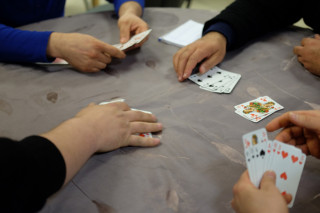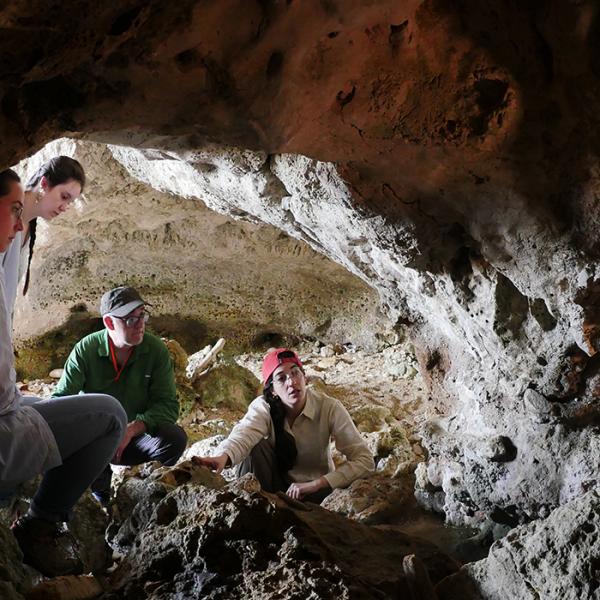The Department of Anthropology at Washington University in St. Louis is home to outstanding graduate students and faculty. One of our current PhD candidates within Sociocultural Anthropology, Oguz Alyanak, is also a scholar at the McDonnell International Scholars Academy and a fellow at the Center for the Humanities.
Oguz collects spatial stories from members of the Turkish community about everyday life in Strasbourg, as well as the larger Franco-German borderland, which includes the neighboring German town of Kehl. He uses these stories to explore how Muslim life in Europe extends beyond the mosque, and plays out in ordinary spaces such as streets, coffeehouses, shisha lounges, and restaurants, among others. He was recently published with three of his fellow graduate students in the 6th edition of Urban Life: Readings in the Anthropology of the City. Their chapter titled "Shadowing as a Methodology: Notes from Research in Strasbourg, Amsterdam, Barcelona, and Milan" introduces and critically evaluates the research methods of shadowing Muslims in European cities during their fieldwork. Oguz took the time to tell us more about his work.
Tell us a little about you.
I was born in Bursa, Turkey, a city located approximately four hours south of Istanbul by car. After spending seven years at a boarding school in Istanbul, I got my bachelors from Clark University, and masters from Bogazici University in political science, and the University of Chicago in social sciences.
What is your research on?
 I am currently writing an ethnography on Muslim men and their going out habits, where I look specifically at their participation in the nighttime economy in Europe. My research stems from a simple question: where do Muslim men who live in European cities go when they go out? The answer, as I came to find out through fieldwork, is complex for what men do outside, and where and how they spend their time and money, is subject to a moral gaze. Men go out and participate in various spaces of leisure and fun—spaces that are not home or work. Going out, however, also brings men in proximity to spaces of potential danger that cater to pleasures that are considered carnal, immoral or sinful. For many members of the Turkish community in Strasbourg, the outside is both an exciting and an anxiety inducing and polluting space, turning the practice of going out into a moral quandary.
I am currently writing an ethnography on Muslim men and their going out habits, where I look specifically at their participation in the nighttime economy in Europe. My research stems from a simple question: where do Muslim men who live in European cities go when they go out? The answer, as I came to find out through fieldwork, is complex for what men do outside, and where and how they spend their time and money, is subject to a moral gaze. Men go out and participate in various spaces of leisure and fun—spaces that are not home or work. Going out, however, also brings men in proximity to spaces of potential danger that cater to pleasures that are considered carnal, immoral or sinful. For many members of the Turkish community in Strasbourg, the outside is both an exciting and an anxiety inducing and polluting space, turning the practice of going out into a moral quandary.The men that I study are working-class migrant Turkish men (and the second and third generation sons born to Turkish parents in Europe). As Muslims, they are bound by certain expectations, such as spending more time with their families at home, or outside with them after work. Or spending more time at the mosque, attending conversation circles and engaging in good deeds. Yet, where I ended up finding them was often times not the home, or the mosque, but instead, places like housing project courtyards, coffeehouses, shisha bars, and other venues in French and German cities across the borderland. These are venues where they are less bound by obligations, and where they feel less the need to conform to behavioral codes or moral norms. These are, however, also spaces that are deemed to encourage immoral and sinful behavior. What is it that they find in these spaces, then? And why is it that despite their ill fame, they continue to hang out in them?
To answer these questions, I have been participating in the lives of Turkish men in Strasbourg, working with them, visiting their homes, and socializing with them after work since 2013. Together we have sought ways to fill a lack, sometimes spiritual, other times emotional or sexual, and searched for the care and respect that my interlocutors considered missing at work or home. What is missing at work and home constitute the theme of the first two sections of my dissertation, where I reflect on my work experience as a busboy at a doner kebab shop, and interviews with couples in their homes. In the third and final section, I take us out in Strasbourg, and across the border to various German towns. With my interlocutors, we pay a visit to a migrant coffeehouse, and a mosque, hang out on the courtyard of the projects with France-born Turkish youth, and go on a drive to a casino in Niederbronn, a brothel in Karlsruhe, a restaurant and a shisha lounge in Mannheim, and a nightclub in Kehl.
What do you do other than research?
In addition to my dissertation work, I participate in public discussions on Turkish politics and society by keeping a regular column for Anthropology News, and publishing with colleagues on issues pertaining to gender politics and violence in Turkey. Two of my most recent publications include a chapter on Turkish soap operas and motherhood in Gender in Cross-Cultural Perspective (Brettell and Sargent 2017), and a methodological chapter on conducting urban anthropological research in European cities, published in Urban Life: Readings in the Anthropology of the City (Gmelch and Kuppinger 2018). At Washington University, I have previously taught Introduction to Cultural Anthropology (Fall 2017), and will teach it again in Summer 2018. In the works is also a course that I will teach in Fall 2018, which will offer an anthropological perspective to recent developments in Turkey and the Near East.
While much of my time is occupied by following news about my home country, I spend whatever time I can salvage by attending the symphony, running at the gym, reading at cafes in the Loop and sitting and chatting with men at pubs who, like many of my interlocutors in Strasbourg, seek to find solace outside sometimes in solitude, other times at others’ company.
More information on Oguz and his research can be found on his department page or through Twitter @oguzbikbik. His fieldwork research in Kayseri and Strasbourg is supported by the Social Science Research Council and the Wenner-Gren Foundation.


